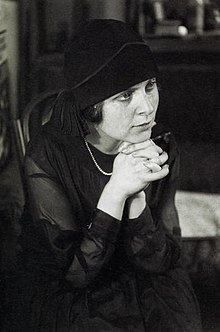Elsa Triolet
Elsa Triolet | |
|---|---|
 | |
| Born | Elsa Kagan 12 September 1896 Moscow |
| Died | 16 June 1970 Saint-Arnoult-en-Yvelines, France |
| Occupation | writer and muse |
| Nationality | Russian then French |
| Notable awards | Prix Goncourt 1944 |
| Partner | André Triolet, Louis Aragon, Aragon |
| Relatives | Lilya Brik |
Elsa Yur'evna Triolet (12 September (or 24 September) 1896 – 16 June 1970), born Elsa Kagan (Russian: Элла Каган),[1] was a French writer.
Biography
Elsa Kagan was born into a Jewish family of a lawyer and a music teacher in Moscow. She and her sister Lilya Brik received excellent educations; they were able to speak fluent German and French and play the piano. Elsa graduated from the Moscow Institute of Architecture.
Elsa enjoyed poetry and in 1915 befriended the aspiring futurist poet and graphic artist Vladimir Mayakovsky. When she invited him home, the poet fell madly in love with her older sister Lilya, who was married to Osip Brik. Elsa was the first to translate Mayakovsky's poetry (as well as volumes of other Russian-language poetry) to French.
In 1918, at the outset of the Russian Civil War, Elsa married the French cavalry officer André Triolet and emigrated to France, but for years admitted in her letters to Lilya to being heartbroken. She later divorced Triolet.
In the early 1920s, Elsa described her visit to Tahiti in her letters to Victor Shklovsky, who subsequently showed them to Maxim Gorky. Gorky suggested that the author should consider a literary career. The 1925 book In Tahiti, written in Russian, was based on these letters.
In 1928 Elsa met French writer Louis Aragon. They married and stayed together for 42 years. She influenced Aragon to join the French Communist Party. Triolet and Aragon fought in the French Resistance.
In 1944 Triolet was the first woman to be awarded the Prix Goncourt.
She died, aged 73, in Moulin de Villeneuve, Saint-Arnoult-en-Yvelines, France of a heart attack.
In 2010, La Poste, the French post office, issued three stamps honoring Triolet.
Bibliography
- На Таити (In Tahiti, in Russian, 1925)
- Fraise des bois (in Russian, 1926)
- Camouflage (in Russian, 1928)
- Bonsoir Thérèse (Good Evening, Theresa - her first book in French, 1938)
- Maïakovski (1939) translation by N. Semoniff (in Russian – published by Т/О “НЕФОРМАТ” Издат-во Accent Graphics Communications, Montreal, 2012)
- Mille regrets (1942)
- Le Cheval blanc (The White Horse, 1943)
- Qui est cet étranger qui n'est pas d'ici ? ou le mythe de la Baronne Mélanie (Who Is This Stranger Who Isn't from Here? or, The Myth of Baronesss Melanie) (1944)
- Le Premier accroc coûte deux cents francs (A Fine of 200 Francs, 1945, Prix Goncourt 1944)
- Personne ne m'aime (Nobody Loves Me, 1946; published in French by Le Temps des Cerises éditeurs, 2014)
- Les Fantômes armés (The Armed Phantoms, 1947; Le Temps des Cerises éditeurs, 2014)
- L'Inspecteur des ruines (The Inspector of Ruins, 1948)
- Le Cheval roux ou les intentions humaines (The Roan Horse, or Humane Intentions) (1953)
- L'Histoire d'Anton Tchekov (The Life of Anton Chekov) (1954)
- Le Rendez-vous des étrangers (1956)
- Le Monument (1957)
- Roses à crédit (1959)
- Luna-Park (1960)
- Les Manigances (1961)
- L'Âme (1962)
- Le Grand jamais (The Big Never) (1965)
- Écoutez-voir (Listen and See) (1968)
- La Mise en mots (1969)
- Le Rossignol se tait à l'aube (1970)
Notes and references
External links
- Elsa Triolet at IMDb
